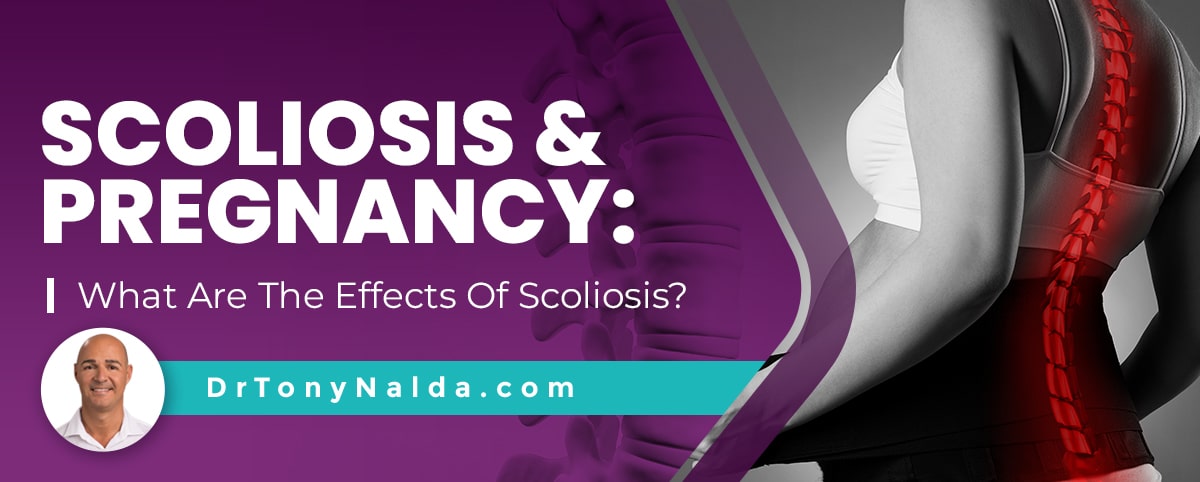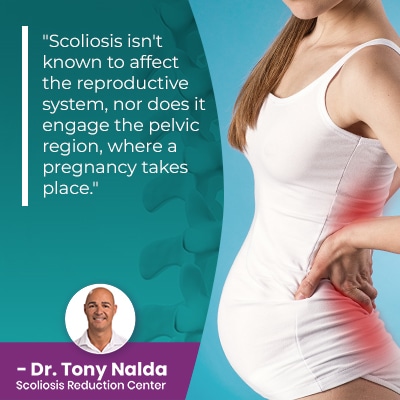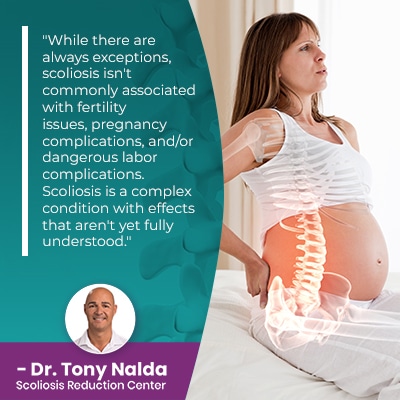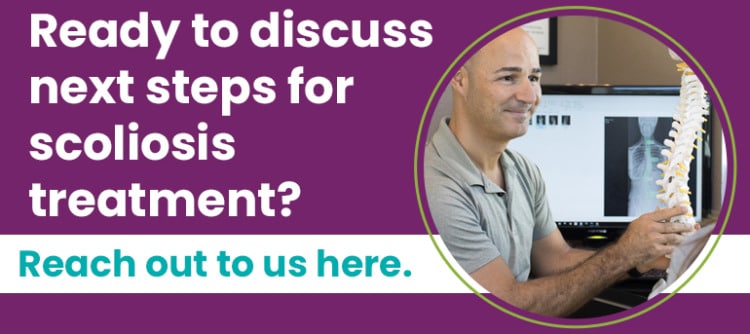Scoliosis & Pregnancy: What Are The Effects Of Scoliosis?

Scoliosis isn't known to make it more difficult to get pregnant, nor to cause an increasing risk of complications during labor. While back pain can be an issue, as it also is for women without scoliosis, women with scoliosis can be at an increased risk.
Scoliosis doesn't directly affect the pelvic area, where a pregnancy occurs, so the effects of scoliosis on pregnancy are thought to be more indirect, than direct; however, scoliosis ranges widely in severity, so its effects can be case-specific.
As condition severity plays a large part in shaping a patient's scoliosis experience, let's start by defining the condition and touching on some of its key characteristics.
Table of Contents
Scoliosis Severity
First of all, scoliosis involves the development of an unnatural sideways spinal curve that has a rotational component, meaning it also twists, making it a 3-dimensional spinal condition.
As there are a number of spinal conditions a person can develop that involve a loss of the spine's healthy curves, to be diagnosed as scoliosis, the unnatural spinal curve also has to be of a minimum size.
A patient's Cobb angle is determined during X-ray by drawing lines from the tops and bottoms of the curve's most-tilted vertebrae, at its apex, and the resulting angle is expressed in degrees.
When the spine's healthy curves are in place, this means its vertebrae (bones of the spine) are aligned and stacked on top of one another as they should be, but when an unhealthy spinal curve develops, this means that some vertebrae have become unnaturally tilted, causing the spine to become misaligned.
A patient's Cobb angle tells me how far out of alignment the spine is and also classifies conditions in terms of severity:
- Mild scoliosis: Cobb angle measurement of between 10 and 25 degrees
- Moderate scoliosis: Cobb angle measurement of between 25 and 40 degrees
- Severe scoliosis: Cobb angle measurement of 40+ degrees
- Very-severe scoliosis: Cobb angle measurement of 80+ degrees
Condition severity is a key variable that shapes the design of treatment plans, and the more severe scoliosis is, the more likely it is that its effects are going to be noticeable, including effects on pregnancy.
In addition, severity is also dictated by condition type, determined by causation.
The most common type of scoliosis is idiopathic, meaning not clearly associated with a single-known cause, and this type accounts for 80 percent of known cases.
The remaining 20 percent are associated with known causes: neuromuscular scoliosis, degenerative scoliosis, and congenital scoliosis, and are atypical cases that tend to be more severe, more disruptive to overall health, more complex to treat, and are more likely to affect pregnancy.
Speaking of the effects of scoliosis, how does the spinal condition tend to affect people?
How Scoliosis Affects the Body
As such a highly-variable condition, no two cases of scoliosis are the same, which is why no two cases of scoliosis will require identical treatment plans.
Patients respond to scoliosis differently based on a number of key patient/condition variables, and those same variables also classify conditions: patient age, condition type, severity, and curvature location.
Patient age is important because it indicates overall health and fitness at the time of diagnosis, determines whether or not the condition is likely to be painful, and how fast it's going to progress.
Progression
Scoliosis is a progressive condition, meaning its nature is to get worse over time, so the condition's severity levels are also its progressive line.
Where a scoliosis is at the time of diagnosis is not indicative of where it will stay; only proactive treatment can work towards counteracting the condition's progressive nature.
We don't always know what triggers the initial onset of scoliosis, but we do know what triggers its progression: growth and development.
So in young patients who are still growing, monitoring for progression is a key focus of treatment, as is achieving a curvature reduction and holding it there, despite the constant progressive trigger of growth.
Progression affects the body by increasing the size of the unnatural spinal curve, which makes the spine more rigid, and introduces more uneven forces to the body.
Scoliosis Pain
Scoliosis doesn't become a compressive condition until adulthood, or until skeletal maturity has been reached, which is why scoliosis is painful for adults and requires pain management, but isn't as painful for children.
Growing spines are constantly being lengthened, and this motion counteracts the compression caused by the unnatural spinal curve, and it's compression of the spine and its surrounding muscles and nerves that causes the majority of scoliosis related pain.
While children can experience varying degrees of back and muscle pain, it's not related to compression, and the main way that scoliosis affects children is postural deviation, and the main symptom of scoliosis in adults is pain.
So what about pregnant women who have scoliosis? Is the condition known to affect them differently?
Scoliosis and Pregnancy
 Scoliosis isn't known to affect the reproductive system, nor does it engage the pelvic region, where a pregnancy takes place.
Scoliosis isn't known to affect the reproductive system, nor does it engage the pelvic region, where a pregnancy takes place.
Scoliosis doesn't appear to have an effect on the reproductive system, so doesn't make it more difficult to get pregnant, nor is it overly associated with an increased risk of complications during labor.
Women with scoliosis are just as likely to be able to deliver healthy babies as women without scoliosis, and can also experience a vaginal delivery; however, some studies do suggest that women with scoliosis are more likely to require a C-section.
Now, when it comes to back pain, this is one of the major complaints of pregnant women, and obviously, when we're talking about scoliosis and pregnant women, we're mainly discussing adult women with scoliosis, for whom the condition is going to be compressive.
So most pregnant patients are going to experience some degree of back pain throughout their pregnancy, but for women with scoliosis, this can increase because of the pre-existing compressive spinal condition.
However, pregnant patients can still be safely treated for their scoliosis, if their chosen treatment approach is conservative, and continuing treatment can help with pain relief.
Here at the Scoliosis Reduction Center, Conservative treatment offers a non-surgical scoliosis treatment option that integrates condition-specific chiropractic care, physical therapy, and rehabilitation.
Does Pregnancy Increase Curve Progression?
One of the major concerns pregnant women experience is if their pregnancy will increase curve progression.
The issue with exploring and discussing the effects of scoliosis on pregnancy is that the research is limited due to the obvious complexities of conducting medical studies on pregnant patients.
 While there are always exceptions, scoliosis isn't commonly associated with fertility issues, pregnancy complications, and/or dangerous labor complications.
While there are always exceptions, scoliosis isn't commonly associated with fertility issues, pregnancy complications, and/or dangerous labor complications.
It's natural for women with scoliosis to wonder if being pregnant will affect their rate of progression, and condition severity is the biggest factor here; the more severe a condition, the larger the scoliotic curve is, and the more likely it is to continue to get worse.
In addition, a patient's health going into the pregnancy will also play a role in how much their scoliosis affects their pregnancy, as scoliosis can affect a person's overall health, but this is more related to severe, very-severe, and conditions that are left untreated.
There are two main theories regarding progression and pregnancy, but they are just that: theories.
The first theory speculates that as pregnancy causes the production of relaxants that naturally soften the spine and pelvis in preparation for delivery, treatment during pregnancy can be beneficial as the spine is going to be more malleable and responsive to chiropractic treatment.
Conversely, as we know that progressing is the very nature of scoliosis, does that mean that a scoliotic spine that's more malleable, due to pregnancy relaxants and hormones, is more likely to follow its nature and progress faster?
Unfortunately, we don't know which theory is more accurate, and due to, again, the inherent challenges of conducting studies on pregnant patients, progression and pregnancy falls under the umbrella of condition effects we have yet to fully understand.
So in the end, to answer the question as clearly as I can, women with scoliosis can experience healthy pregnancies, can deliver healthy babies, many vaginally, and the most direct connection I can see between scoliosis and pregnancy is how scoliosis has affected a person's health going into the pregnancy.
So in mild and moderate conditions that tend to have mild effects, it's unlikely that scoliosis will overly impact patients' pregnancies, but if a patient has severe or very-severe scoliosis, overall health is more likely to be affected, and this is can affect a patient's pregnancy, but this connection is more indirectly, than directly, related to the scoliosis.
Conclusion
So while we don't understand the full effects of scoliosis on pregnancy, we know that in the majority of cases where a women is healthy and receiving scoliosis treatment, affects are often limited to back pain, but even that is difficult to determine; how much is related to the pregnancy alone, the scoliosis, or a combination of the two?
Scoliosis introduces a lot of uneven forces to the body, which is why its main effects are postural deviation and pain (adults).
When scoliosis is painful, the best remedy is proactive treatment that addresses the underlying structural nature of the condition.
Proactive treatment works towards achieving a curvature reduction, which also reduces the condition's uneven forces, and their effects, while also working towards increasing core strength so the spine is optimally supported by its surrounding abdominal muscles.
So for women going into a pregnancy whose scoliosis is being proactively treated, and who are healthy to begin with, the effects of scoliosis on pregnancy can be minor, if any, but for those whose scoliosis is severe and/or who haven't received treatment, their health going into the pregnancy is going to be less than optimal, with higher chances of pregnancies being affected.
Leaving scoliosis untreated increase the likelihood of developing condition-related complications such as difficulty breathing due to lung impairment, muscle weakness, muscle imbalance, digestive issues, headaches, and hormonal fluctuations.
As is the case with typical pregnant patients without scoliosis, the pregnancy experience is more likely to be pleasant and uncomplicated if the patient was healthy beforehand, and the same can be said of scoliosis patients wanting to have a healthy pregnancy.
Here at the Scoliosis Reduction Center, I continue to treat and support my pregnant scoliosis patients throughout the entirety of their pregnancies, and this is the best way to minimize the condition's effects and alleviate pain.?s=
Dr. Tony Nalda
DOCTOR OF CHIROPRACTIC
After receiving an undergraduate degree in psychology and his Doctorate of Chiropractic from Life University, Dr. Nalda settled in Celebration, Florida and proceeded to build one of Central Florida’s most successful chiropractic clinics.
His experience with patients suffering from scoliosis, and the confusion and frustration they faced, led him to seek a specialty in scoliosis care. In 2006 he completed his Intensive Care Certification from CLEAR Institute, a leading scoliosis educational and certification center.
About Dr. Tony Nalda
 Ready to explore scoliosis treatment? Contact Us Now
Ready to explore scoliosis treatment? Contact Us Now





